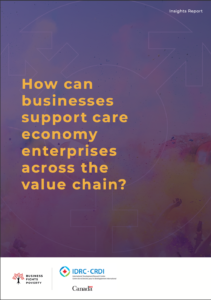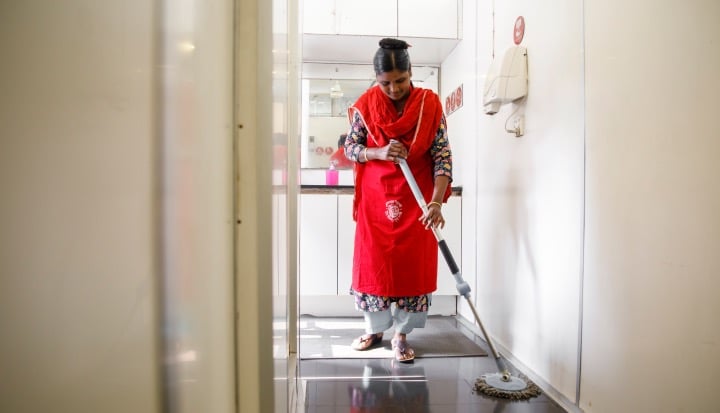
The interviews with five Business Fights Poverty Lead Partners, Primark, Unilever, Anglo American, Standard Chartered and Mastercard Center for Inclusive Growth, focussed on two areas. Firstly, how their companies are currently supporting social entrepreneurs and secondly if and how their companies are addressing the care economy through workplace policies.
These lines of questioning led to 4 overarching insights:
- Companies need to better understand how care impacts their business
- Workplace policies can offer a springboard to engage with care enterprises (e.g. responsible recruitment of domestic workers, responsible sourcing of cleaning services)
- Companies with extensive supply chains could help enterprises achieve scale (companies can be a bridge essentially linking their workers with social enterprises to help them access low cost, quality care services)
- Philanthropic entrepreneurship programmes could be more focussed on supporting care enterprises.

INTERVIEW WITH MATTHEW DAVIDSON, SENIOR SOCIAL IMPACT EXECUTIVE, PRIMARK
What was Primark’s motivation for looking at how workers balance caring and work responsibilities?
Whilst we have an obligation to ensure factories comply with labour standards, we need to be conscious of the experiences outside of the workplace that have impacts on workers in their daily lives. A factory worker is not a worker in isolation and has obligations at home, or in their communities, that can limit their ability to participate or progress in the workplace. In 2020 we contributed to research conducted in Bangladesh by the FCDO Work and Opportunities for Women (WOW) programme called ‘The Double Day’. This research confirmed many assumptions we had that women disproportionately conduct most of the unpaid care and domestic tasks in the home on top of their working hours. It is estimated that women conduct around 4-6 hours of unpaid care and domestic work a day. This was also supported by research conducted in 2023 by the Ethical Trading Initiative (ETI) who explored the reasons for women workers drop-out from, or barriers to re-enter, the workplace.
In 2021 we launched our ‘Primark Cares’ sustainability strategy, nine commitments that will help us become a more sustainable and circular business, with 3 key focus areas – people, planet and product. Within our People pillar, we have committed to working towards promoting equal opportunities for women, of which addressing the burden of unpaid care work plays a role. We are really conscious that these barriers exist and need to further build our own knowledge and learn how we can best address this.
How does your company currently support women to balance work and caring responsibilities in factories?
Every factory that makes products for Primark is audited at least once a year against our Supplier Code of Conduct which is built on the ILO [International Labour Organisation] fundamental conventions and the ETI [Ethical Trading Initiative] base code. This includes areas that relate to unpaid care work support such as rights for pregnant workers, maternity leave and benefits, and post-natal care. In parallel to our audit programme, our Primark-approved supplier factories must comply with all relevant laws and regulations of the country in which they operate. In some countries, such as Turkey and Bangladesh, there is specific legislation around the need for on-site childcare facilities or support for factories that meet the worker number threshold. Whilst it is reassuring to see governments working to address this burden and support parents back into the workplace, these services are often under-utilised by eligible workers due to a lack of trust in the abilities of the caregivers at the facilities or social norm and cultural expectations that family members, often older women, are to provide childcare.
It is important to note here that unpaid care is much more than childcare. Whilst this responsibility receives the most attention and focus, other care obligations should not be overshadowed, such as care for the elderly and chores such as cooking, cleaning and grocery shopping. Basic healthcare is something that many women also support within their role of caregiver to family and community members when they are sick.
You have set up an internal working group to look at unpaid care – how does it work?
Our ethical trade and environmental sustainability team are one of our most important resources, with more than 130 team members based in our 12 key sourcing markets. These are local people who understand the local culture and context and are our eyes and ears on the ground. Working with these colleagues, I have started a working group with representatives from the country teams to build out the understanding of this topic and the context in which this exists in different cultural environments. We have been working with the Netherlands based NGO Women Win to help build our understanding on best practice approaches, potential areas of engagement, and opportunities to address this burden for those it affects in our supply chain. Existing literature is quite limited in terms of what brands have been doing in this space but it is exciting as it has shown us what could be done.
Is social innovation important to your company and have you ever supported entrepreneurs?
Yes – for me, social entrepreneurs should be seen as ‘proximity leaders’ – they are close to the problems and solutions. They are individuals who know the local culture through experience. We are looking at this space and working with an India-based social enterprise called Haqdarshak. Haqdarshak use a digital solution that provides workers with key information about their social protection entitlements, insurance products and supports their access of these schemes. We have conducted a needs assessment in four factories in Bangalore to understand the interest and uptake of the solution and will pilot further in other factories. It’s really exciting that we can be a bridge where workers in our supply chain can, in effect, be a customer base to a social enterprise and their solution.
One of our challenges is finding relevant social enterprises on a local level. On the care economy side we know about the Global Alliance for Care, but there doesn’t seem to be a lot out there on entrepreneurs that are working in this space. We would like to do further research into which enterprises are out there to support us addressing issues relating to worker drop out and re-entry barriers.
READ MORE INTERVIEWS FROM THIS SERIES:
- Lisa Hawkes, Global Senior Sustainability Manager, Unilever
- Zaheera Soomar, Head of Education and Community Skills, Strategy and Sustainability, Anglo American
- Payal Dalal, Senior Vice President, Social Impact, International Markets, Mastercard Center for Inclusive Growth
- Natasha Kwakwa, Global Head, Impact, Standard Chartered











One Response
The care economy is one of the areas with the greatest exemplifications of gender inequalities at communities and households in many communities especially where poverty dominates.
To sustain any efforts of corporations to help creating a balance in the responsibility for unpaid care economy, engagements with CBOs to design projects and programs that influence change of gender attitudes and perception of sharing this responsibility becomes inevitable as part of the programs of businesses to help fight poverty.